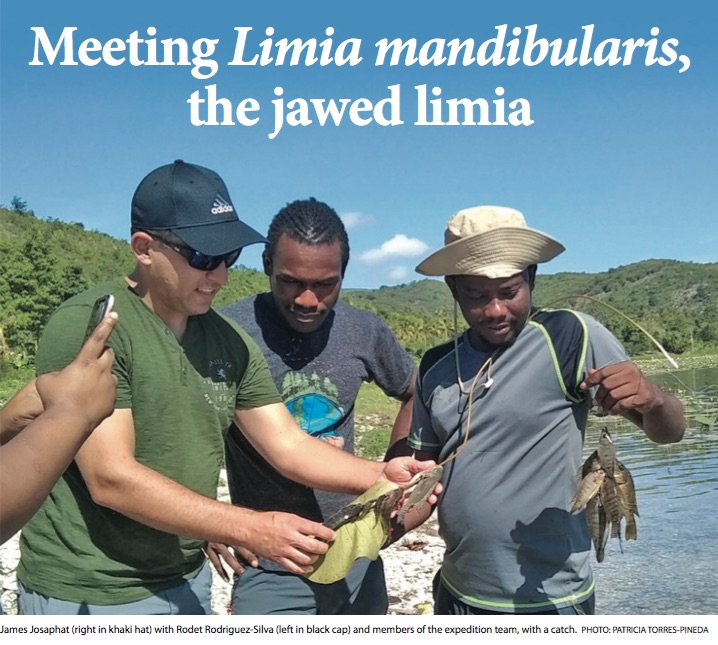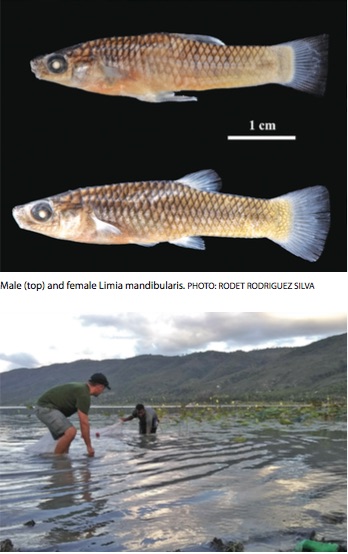
The phenomenon of “brain-drain” is well-known to the Caribbean, as many of our brightest have an easier time finding opportunities abroad. Programmes such as the Caribaea Initiative, whose mission includes training and supporting the next generation of conservation scientists within the Caribbean, allow passionate young minds like James to do the much-needed local work with support, funding and other opportunities.
In 2018, James met fellow fish-enthusiast (the scientific study of fish is called Ichthyology) and Cuban PhD student at the University of Oklahoma Rodet Rodriguez-Silva at the Latin America and Caribbean Congress for Conservation Biology, which was held in Trinidad and hosted by the Department of Life Sciences at the St Augustine Campus. They made plans for the historical expedition that would lead to the discovery of a new species.
“Back in Haiti, after the master’s was complete, my first field work experience with fish was with Rodet. I learned a lot from him in the capture methods and identification of fish, especially in Lake Miragoâne,” says James.
This lake, in the south west of Haiti, is where they made their incredible discovery— a fish they called Limia mandibularis, a cousin of the Trinidadian guppy. “It was very exciting for me because I am very young in the field and I was able to be a part of a team that discovered a new species in my country in my first major research project since completing my master’s.”
Limia mandibularis is not the only exciting creature to be found in Haiti’s natural world. Haiti appears to be a hot spot of endemism for this group.
The fish, whose discovery was recently published in the journal Zootaxa, is an endemic species— which means it is only found in Haiti. Its name, “jawed limia”, comes from its well-developed lower jaw (mandible). According to Professor Ingo Schlupp, a poeciliid expert from the University of Oklahoma, “This is the most unusual mouth I have ever seen in a livebearing [retains the eggs inside the body and gives birth to live offspring] fish.” In other words, this fish is sporting a wicked underbite.
But Limia mandibularis is not the only exciting creature to be found in Haiti’s natural world. Haiti appears to be a hot spot of endemism for this group, with a total of nine species of Limia discovered to live only there. So James and the cross-Caribbean team have a lot of exciting work ahead.

Starting with a Haitian and a Cuban meeting in Trinidad, and going on to include scientific collaboration between Haiti and the Dominican Republic with the addition of Patricia Torres-Pineda, this is truly an inter-Caribbean endeavour.
What’s next for James and the team?
“More research on freshwater fish in Haiti!” he says enthusiastically. He is now working on his PhD at l’Université des Antilles in Guadeloupe, and plans to continue his research in Haiti with the support of Dr Deacon and others.
“I’ll continue to be involved, even though I’m in Trinidad, because I’ll be on his advisory committee,” she says. “I’ll be remotely supervising, with a couple of other academics from other universities. I’ve got high hopes for him in the future. He’s exactly the graduate we want from the master’s because he’s taking what we’ve taught him and doing great work with it.”
From the well-studied rivers of Trinidad to the massively understudied waterways in Haiti, James has had a wide variety of experiences working in the field. In Haiti, access to the field can be difficult, and a local guide is mandatory on all expeditions for security reasons. Without biological laboratories or a museum of natural history, there is no designated space to monitor collected data or the storage of specimens. There is a great deal of work to be done, but that means there are great opportunities to venture into the relatively unknown, and perhaps discover new life.
Although Haiti has suffered major environmental problems like pollution, deforestation and the spread of invasive species, it remains one of the Caribbean hotspots for new discovery possibilities. Now more than ever, it is vital that its biodiversity be studied and protected— but many of its issues are intertwined with its socio-economic situation and now compounded by a massive outbreak of COVID-19 with over a thousand cases, and several thousand suspected cases.
It is a country with an awe-inspiring history of struggle and passion, and people like James are determined to change the perception of his home.
“Many persons in the Caribbean who have never visited Haiti have very bad perceptions of the country. While Haiti is poor financially, it is rich in a lot of natural resources, and as its biodiversity is pristine, it is a great place for research in the Caribbean. I hope that in the future many more research projects will be conducted in Haiti, as my country has a lot to offer,” says James.
And he intends to make good on his promise to pull back the curtain on the incredible natural world of Haiti.